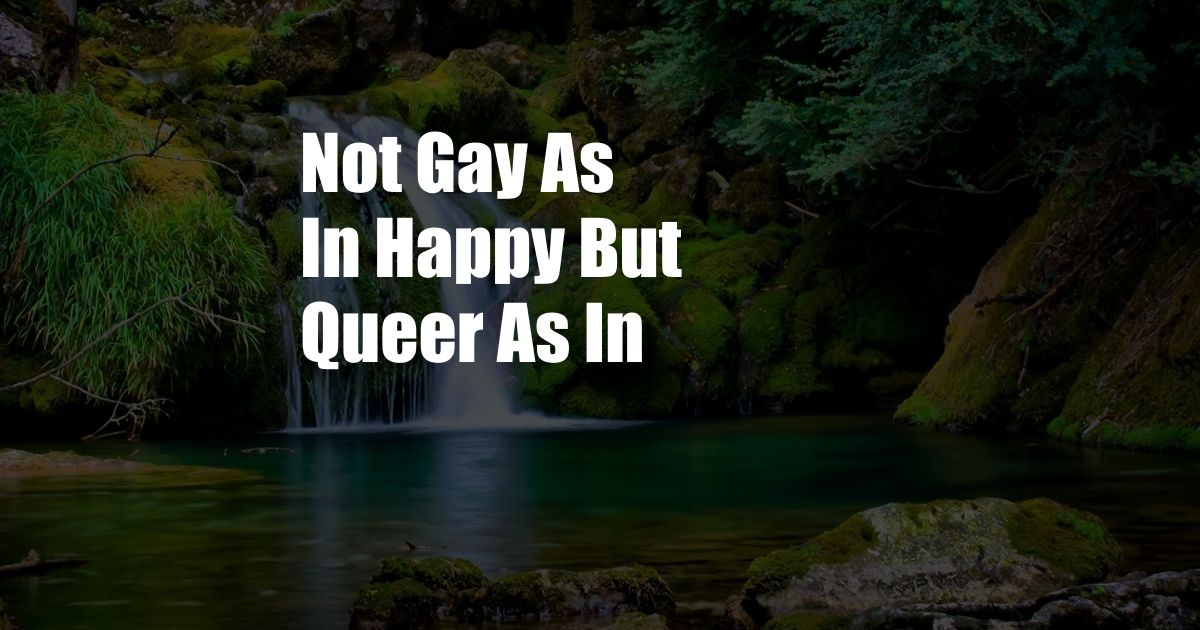
<!DOCTYPE html>
**Not Gay as in Happy, but Queer as in…”**
Growing up, I always felt a little bit different. I didn’t fit in with the other kids, and I didn’t always understand why. It wasn’t until I was in college that I finally realized that I was queer. It was like a weight had been lifted off my shoulders. Finally, I understood why I had always felt so different.
Queer is a term that can be used to describe anyone who doesn’t identify as heterosexual or cisgender. It’s an umbrella term that encompasses a wide range of identities, including lesbian, gay, bisexual, transgender, queer, and intersex (LGBTQI).
**The History of Queerness**
The history of queerness is long and complex. LGBTQI+ people have been around for centuries, but it wasn’t until the late 19th century that the term “queer” began to be used to describe them. In the early 20th century, queer was used as a slur, but in the 1970s, LGBTQI+ activists began to reclaim the term and use it as a positive way to describe their identities.
Today, queer is a widely accepted term that is used to describe LGBTQI+ people of all ages, races, and backgrounds. It is a term that is both inclusive and empowering, and it has become a symbol of the LGBTQI+ community’s pride and resilience.
**What Does It Mean to be Queer?**
Being queer means different things to different people. For some, it means simply not identifying as heterosexual or cisgender. For others, it means being actively involved in the LGBTQI+ community. And for still others, it means challenging the traditional definitions of gender and sexuality.
One of the most important things to remember about queerness is that there is no one right way to be queer. Queer people are as diverse as any other population group, and there is no single definition of what it means to be queer.
**The Latest Trends and Developments in Queer Culture**
In recent years, there has been a growing visibility of queer people in the media and in popular culture. This has led to a greater understanding and acceptance of queer people, and it has also helped to create a more inclusive society.
However, there is still much work to be done to achieve full equality for LGBTQI+ people. In many parts of the world, queer people still face discrimination and violence. And even in countries where LGBTQI+ rights are protected, there is still a long way to go before queer people are fully accepted and included in society.
**Tips and Expert Advice for Queer People**
If you are queer, it is important to know that you are not alone. There are millions of other queer people around the world, and there are many resources available to support you.
Here are a few tips and pieces of expert advice for queer people:
- Come out on your own terms. There is no right or wrong time to come out, and you should only do it when you feel ready.
- Find a community of supportive people. There are many LGBTQI+ organizations and groups that can provide you with support and resources.
- Be yourself. Don’t try to be someone you’re not, and don’t let anyone tell you who you should be.
- Fight for your rights. LGBTQI+ people have fought hard for their rights, and it is important to continue to fight for equality.
- Be proud of who you are. Being queer is a beautiful thing, and you should be proud of who you are.
**FAQs About Queerness**
Q: What does it mean to be queer?
A: Being queer means not identifying as heterosexual or cisgender. It is an umbrella term that encompasses a wide range of identities, including lesbian, gay, bisexual, transgender, queer, and intersex (LGBTQI).
Q: Is there a right or wrong way to be queer?
A: No, there is no right or wrong way to be queer. Queer people are as diverse as any other population group, and there is no single definition of what it means to be queer.
Q: What are some of the challenges that queer people face?
A: Queer people face a number of challenges, including discrimination, violence, and lack of acceptance. In many parts of the world, queer people are still not fully accepted or included in society.
Q: What can queer people do to fight for their rights?
A: Queer people can fight for their rights by coming out, being visible, and speaking out against injustice. They can also support LGBTQI+ organizations and groups, and work to create a more inclusive society.
**Conclusion**
Being queer is a beautiful thing. It is a celebration of diversity and individuality. If you are queer, be proud of who you are. You are not alone.
Are you interested in learning more about queerness?